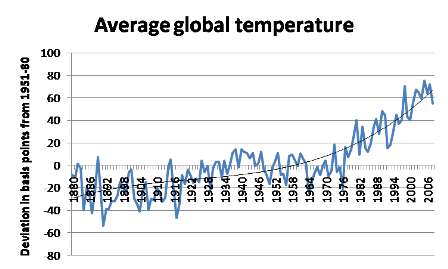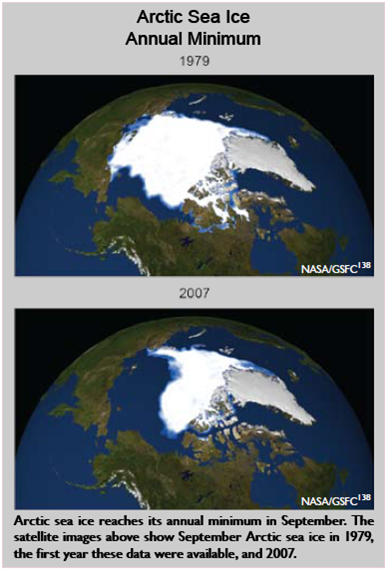Or a carton of milk, or a loaf of bread.
Both George Will and Greg Mankiw basically argue that we don’t need a government role because we can trust the market to work — hey, we do it for groceries, right?
Um, economists have known for 45 years — ever since Kenneth Arrow’s seminal paper — that the standard competitive market model just doesn’t work for health care: adverse selection and moral hazard are so central to the enterprise that nobody, nobody expects free-market principles to be enough. To act all wide-eyed and innocent about these problems at this late date is either remarkably ignorant or simply disingenuous.
Krugman: Temperature trends
One of the favorite arguments of climate-change deniers is “but it was warmer in the late 90s.” In fact, the odds are good that I’ll get that argument from George Will on This Weak tomorrow. I basically know the answer: temperature is a noisy time series, so if you pick and choose your dates over a short time span you can usually make whatever case you want. That’s why you need to look at longer trends and do some statistical analysis. But I thought that it would be a good thing to look at the data myself.
So here’s average annual global temperature since 1880, shown as .01 degrees C deviation from the 1951-80 average.

What this tells me is that annual temperature is indeed noisy: there have been many large fluctuations, indeed much larger than the up-and-down in the last decade or so. But the direction of change is unmistakable if you take the longer view. The fitted line in the figure is a 3rd-degree polynomial, but any sort of smoothing would tell you that there is a massive upward trend.
Of course, trend-spotting is no substitute for causal modeling; and the models are getting truly scary in their implications.
- Krugman: Another note on short-term pseudo-trends
As I noted in my previous post, a lot of climate-change denial rests on spurious short-term comparisons: you pick a warm recent year, say 1998, and say “well, the trend has been down since then.”
If you want a simple analogy to see why that’s wrong, consider daily temperatures over the course of a year. Here’s data on average daily temperatures in NYC. If you look at the months of April and May, you find that the warmest day was — April 26. So clearly it’s nonsense to say that New York’s weather is getting warmer as we move into summer ….
Krugman: Scary picture
Krugman (op-ed): Betraying the Planet
So the House passed the Waxman-Markey climate-change bill. In political terms, it was a remarkable achievement.
But 212 representatives voted no. A handful of these no votes came from representatives who considered the bill too weak, but most rejected the bill because they rejected the whole notion that we have to do something about greenhouse gases.
And as I watched the deniers make their arguments, I couldn’t help thinking that I was watching a form of treason — treason against the planet.
To fully appreciate the irresponsibility and immorality of climate-change denial, you need to know about the grim turn taken by the latest climate research.
The fact is that the planet is changing faster than even pessimists expected: ice caps are shrinking, arid zones spreading, at a terrifying rate. And according to a number of recent studies, catastrophe — a rise in temperature so large as to be almost unthinkable — can no longer be considered a mere possibility. It is, instead, the most likely outcome if we continue along our present course.
Thus researchers at M.I.T., who were previously predicting a temperature rise of a little more than 4 degrees by the end of this century, are now predicting a rise of more than 9 degrees. Why? Global greenhouse gas emissions are rising faster than expected; some mitigating factors, like absorption of carbon dioxide by the oceans, are turning out to be weaker than hoped; and there’s growing evidence that climate change is self-reinforcing — that, for example, rising temperatures will cause some arctic tundra to defrost, releasing even more carbon dioxide into the atmosphere.
Temperature increases on the scale predicted by the M.I.T. researchers and others would create huge disruptions in our lives and our economy. As a recent authoritative U.S. government report points out, by the end of this century New Hampshire may well have the climate of North Carolina today, Illinois may have the climate of East Texas, and across the country extreme, deadly heat waves — the kind that traditionally occur only once in a generation — may become annual or biannual events.
In other words, we’re facing a clear and present danger to our way of life, perhaps even to civilization itself. How can anyone justify failing to act?
Well, sometimes even the most authoritative analyses get things wrong. And if dissenting opinion-makers and politicians based their dissent on hard work and hard thinking — if they had carefully studied the issue, consulted with experts and concluded that the overwhelming scientific consensus was misguided — they could at least claim to be acting responsibly.
But if you watched the debate on Friday, you didn’t see people who’ve thought hard about a crucial issue, and are trying to do the right thing. What you saw, instead, were people who show no sign of being interested in the truth. They don’t like the political and policy implications of climate change, so they’ve decided not to believe in it — and they’ll grab any argument, no matter how disreputable, that feeds their denial.
Indeed, if there was a defining moment in Friday’s debate, it was the declaration by Representative Paul Broun of Georgia that climate change is nothing but a “hoax” that has been “perpetrated out of the scientific community.” I’d call this a crazy conspiracy theory, but doing so would actually be unfair to crazy conspiracy theorists. After all, to believe that global warming is a hoax you have to believe in a vast cabal consisting of thousands of scientists — a cabal so powerful that it has managed to create false records on everything from global temperatures to Arctic sea ice.
Yet Mr. Broun’s declaration was met with applause.
Given this contempt for hard science, I’m almost reluctant to mention the deniers’ dishonesty on matters economic. But in addition to rejecting climate science, the opponents of the climate bill made a point of misrepresenting the results of studies of the bill’s economic impact, which all suggest that the cost will be relatively low.
Still, is it fair to call climate denial a form of treason? Isn’t it politics as usual?
Yes, it is — and that’s why it’s unforgivable.
Do you remember the days when Bush administration officials claimed that terrorism posed an “existential threat” to America, a threat in whose face normal rules no longer applied? That was hyperbole — but the existential threat from climate change is all too real.
Yet the deniers are choosing, willfully, to ignore that threat, placing future generations of Americans in grave danger, simply because it’s in their political interest to pretend that there’s nothing to worry about. If that’s not betrayal, I don’t know what is.

No comments:
Post a Comment